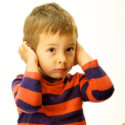What is autism? Children with autism have difficulty in four main areas. These are:
Area 1: Communicating with other people.
Area 2: Understanding and using language.
Area 3: Sensory processing.
Area 4: Being flexible in play and behaviour.
Autism is a lifelong condition. But it’s important to remember that each child is totally unique. So some children are ‘high functioning’ (high level of ability), whilst others are not. Children with autism have widely differing skills and levels of difficulty: what is true for one child may not be true for the next. This is why autism is a ‘spectrum’. Autism shares common features with other conditions. So, it is important that an expert diagnoses whether or not a child is on the spectrum.

What causes autism? There is lots of on-going research in this area. There is some evidence that this condition runs in families. For example, an uncle or grandparent may also have autism and there appears to be a genetic link. Some studies are looking at whether other factors could perhaps cause autism.
What might you notice? Parents sometimes notice that their child is late talking, or doesn’t talk at all. Children with autism are often delayed in their play skills. Sometimes, children can be quite ‘rigid’ in their play, for example lining up cars, rather than playing with them. They can show inflexible behaviour, finding changes in routine challenging. Some children with autism have poor skills in non-verbal communication, so they may make less eye contact than you would expect.
10 positive things about autism
- The right support, put in place early on, helps children improve their communication, language and play skills.
- Many children with autism are good visual learners.
- Children with autism learn, change and develop new skills, just like other children.
- Structured play situations help children with autism to develop their play skills.
- Around 75% of autistic children will learn to talk.
- Children with autism can be very loving, just like other children.
- Some autistic children laugh, make jokes, have friends and do well socially.
- Some children with autism will go on to higher education, for example ‘A’ levels, university degrees and even PhDs.
- Some autistic adults work and live independently.
- There is lots of support available for children and parents.
Further advice and information
For advice and information on how to help a child with autism, please get in touch with Kirsty at Happy Talk. A good website to look at for more information is www.autism.org.uk. There is an interesting article, written as if from a child’s point of view at http://www.autismspeaks.org/family-services/tool-kits/100-day-kit/ten-things-every-child-autism-wishes-you-knew.
.







